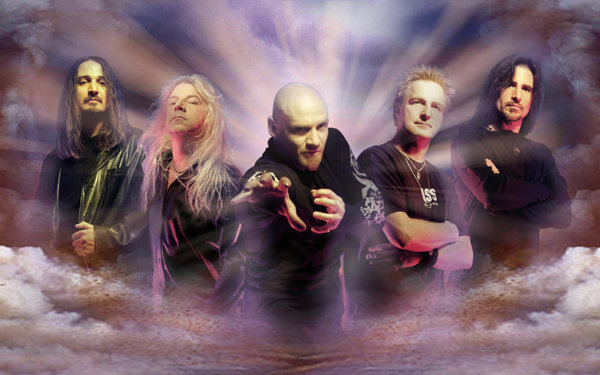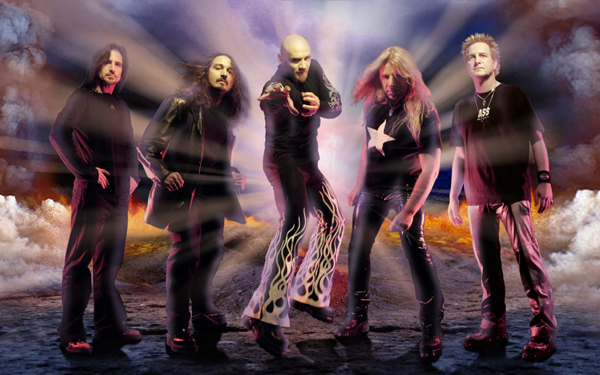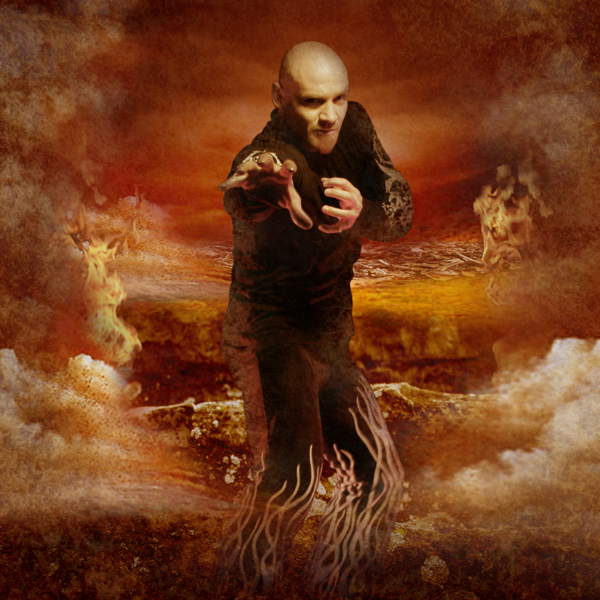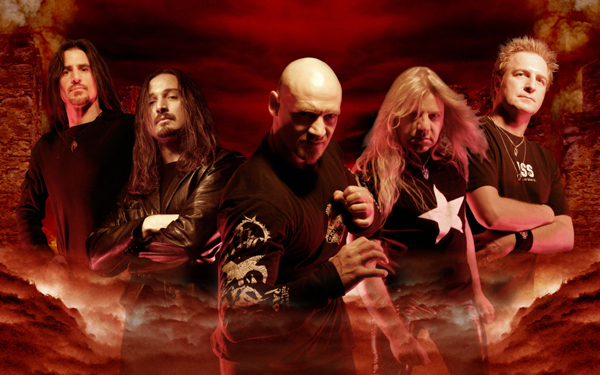
Если вы послушаете наши предыдущие пять альбомов, то легко определите в них некую общую основу, красной линией проходящую через все наши диски – мы всегда играли достаточно прямолинейный металл с мощной ритм-секцией. В этот раз мы решили сделать музыку немного более эпичной, добавили клавишные и струнные «подкладки». На нашем альбоме в первый раз есть целых три песни, длящиеся больше 7 минут. Но фэны могут не опасаться, мы не меняли свой стиль радикально, и они найдут для себя на альбоме много интересного, например, им наверняка понравятся песни типа открывающей альбом “Demons And Angels” или мощной и скоростной “Evil Spell”. Думаю, этим альбомом мы удовлетворим самые разнообразные вкусы.
Для работы над “Seven Seals” вы привлекли много новых людей. Расскажи, насколько весомым был их вклад.
Для того, чтобы результат получился наилучшим, мы решили сменить все свое окружение. Во-первых, мы пригласили Чарли Бауэрфайнда – мы знаем его уже много лет, я знаком с ним еще со времен Gamma Ray, мы познакомились, когда он микшировал альбом “Insanity & Genius” (1993). Мэт (Синнер, басист) тоже хорошо знает его по работе с Hammerfall – они познакомились, когда Мэт как-то приезжал к Hammerfall в студию, чтобы что-то вместе записать. И мы подумали, что будет здорово, если он приедет к нам на север Германии и поможет нам в записи альбома. Он как раз оказался не занят, и мы остались очень довольны конечным результатом. У него определенный стиль работы с техникой, он всегда добивается четкости и точности в деталях, а нам как раз этого и не хватало. И я думаю, его вклад отчетливо слышен на записи. Во-вторых, мы пригласили замечательного человека для микширования альбома. Во время подготовки к записи мы много говорили об этом и пришли к выводу, что нам нужен настоящий профессионал. Мы остановили свой выбор на Майке Фрейзере, который прекрасно справился со своей работой. Он раньше работал с такими монстрами, как AC/DC, Metallica, Брайан Адамс и многими другими, но наш материал тоже пришелся ему по душе. Когда мы приехали в Ванкувер, оказалось, что он просто потрясен материалом, который мы привезли на жестком диске. Так что все вовлеченные в процесс записи люди вложили в этот альбом все свои силы, всю свою страсть, и для нас большая честь, что все они согласились помочь нам. Майк Фрейзер даже вызвался спродюсировать наш следующий альбом, и это просто здорово.
Вы также сменили оформителя – над обложкой “Devil’s Ground” (2003) работал русский художник Лео Хао, новый же альбом оформлял Мартин Хауслер. Почему вы остановили свой выбор именно на нем?
Я бы не стал говорить, что мы специально отказались от услуг одного художника, чтобы пригласить другого. Мы просто разослали всем наши идею насчет того, что бы нам хотелось видеть на обложке диска, и работа Мартина нам понравилась больше всего. Также в оформлении этого альбома принимала участие девушка по имени Катя Пьолка. Вообще, это наш обычный метод работы – мы рассылаем свои идеи, люди над ними работают, а потом мы выбираем самое на наш взгляд лучшее. А работа Мартина нам именно такой и показалась. Мы отказались от услуг Лео вовсе не потому, что он сделал бы хуже (смеется), просто мы выбрали из присланных нам работ ту, которая показалась нам наиболее подходящей.
На “Devil’s Ground” в процессе написания песен участвовали все музыканты, кроме нового ударника Рэнди Блэка. Скажи, а сейчас он принимал участие в работе над песнями? Ведь в своей предыдущей группе Annihilator он писал достаточно много…
Нет, песни обычно пишем мы четверо, но если у Рэнди появятся какие-нибудь идеи, то ему никто не станет препятствовать. Мы пригласили Рэнди в группу исключительно в качестве барабанщика, но он может с полным правом сказать, что он участник группы, потому что он вкладывает в группу всю свою душу. Но в процессе написания песен он пока не принимает участия.
Почему вы назвали альбом “Seven Seals”? Ведь если мы не ошибаемся, это ваш шестой, а не седьмой альбом…
Да. (Смеется). Но мы же не могли назвать альбом “Six Seals” (“Шесть печатей”), ведь в Библии-то их было семь! (Дружный смех). На этом альбоме мы решили затронуть тему Откровения Иоанна Богослова, в Библии ведь можно найти много любопытного, хотя я и не сильно в теме. Эту концепцию предложил Мэт, и нам всем она как-то сразу пришлась по душе, потому что библей
 ская тематика – это почти безграничное поле для работы.
ская тематика – это почти безграничное поле для работы. На альбоме, особенно на его заглавном треке, явно слышны восточные мотивы. Откуда они появились? Кто-нибудь в группе увлекается восточной культурой или музыкой?
Дело в том, что идея песни “Seven Seals” принадлежала Мэту, и он написал ее вместе с одним парнем из Швеции по имени Ронни Мильянович (бывший ударник Sinergy – прим. ред.). Ронни активно помогает многим шведским группам, и Мэт познакомился с ним, когда они вместе работали над сольником Йоакима Канса. Еще тогда они решили сделать что-нибудь ботать вместе, что и вылилось в результате в совместную работу над песней “Seven Seals”, к которой Ронни написал интро. Мне оно очень нравится, но я понятия не имею, насколько он всем этим увлекается.
Ты упомянул “Evil Spell”, песню, которая является, пожалуй, вашей самой тяжелой и быстрой на сегодняшний день. Как она появилась? Вы намеренно хотели сделать ее именно такой, так сказать, выйти за рамки собственного стиля, попробовать то, чего не делали раньше?
Нет, это получилось само собой. Как я уже говорил, над песнями обычно работаем мы четверо, и в этот раз идея песни исходила от Штефана Ляйбинга. Он прекрасный гитарист, и, к тому же, ему отлично удается написание скоростных гитарных и барабанных партий. Помню, как-то он сидел в моей маленькой студии, где мы обычно записываем демо, и где я нахожусь в данный момент, и ему пришла в голову идея этой песни – я был просто в восторге! (Смеется).
А в целом, как вы обычно сочиняете песни? Вы собираетесь вместе и джемуете, или же каждый работает над своими идеями, а потом вы пытаетесь их объединить?
Когда как. Над последним альбомом мы преимущественно работали по раздельности в своих маленьких студиях, которые чаще всего состоят из одного компьютера и программного обеспечения вроде Qbase или Pro-Tools. Мы накапливаем идеи и фрагменты песен, а потом, когда собираемся вместе, пытаемся все объединить. В последний раз, например, мы долго джемовали в репетиционной студии. Так что мы всегда работаем по-разному, так было и с “Seven Seals” – мы встречались и джемовали, но при этом использовали и индивидуальные наработки, которые приносили с собой на жестких дисках.
Вы с Мэтом скоро примете участие в записи концертного DVD бразильской группы Tribuzy, для чего специально полетите в Бразилию…
Буквально на днях выходит альбом Tribuzy, который называется “Execution”, для которого мы записали песню “The Nature Of Evil” (кавер песни Sinner – прим. авт.), а также я записал для нескольких песен бэк-вокал. А поскольку у них скоро планируется большой концерт в Бразилии, то он (лидер и основатель группы Ренато Трибузи – прим. авт.) пригласил нас принять в нем участие. В этом шоу будет также принимать участие Брюс Дикинсон из Iron Maiden, с которым мы споем несколько песен Maiden, и я с нетерпением жду этого дня. Также я спою песню “Absolution”, которая в оригинале исполняется Михаэлем Киске, но поскольку он приехать не сможет, эту песню спою я.
Как этому бразильцу удалось уговорить вас принять участие в записи своего альбома?
Ему просто пришла в голову эта идея, он позвонил нам и сказал, что ему бы хотелось, чтобы мы спели одну его песню. Мы не имели ничего против, так что просто пошли в студию и записали наши партии. (Смеется). Он несколько раз обращался к нам с этой просьбой, но дело в том, что мы постоянно заняты в Primal Fear и у нас не так много свободного времени. Однако как-то раз нам удалось найти время, к тому же, Ренато оказался классным парнем, и мы все записали.
Что требуется от группы, которая хотела бы пригласить тебя принять участие в записи своего диска?
(Смеется). Как-то, несколько лет назад Арьен (Энтони Люкассен, мастермайнд проекта Ayreon – прим. авт.) пригласил меня принять участие в записи одного из его дисков (альбом “Flight Of The Migrator” ( 2000) – прим. авт.), но вообще мне не хочется распыляться, я хочу, чтобы люди слышали мой голос только в Primal Fear. Некоторые вокалисты слишком увлекаются участием в различных сторонних проектах, они разбазаривают свой голос направо и налево, я же считаю, что вокалист должен быть уникальным, и поэтому хочу сохранить свой голос исключительно для Primal Fear.
Но ведь ты также появлялся на нескольких альбомах группы Scanner – что тебя подтолкнуло к участию в этом проекте?
О-о, это было так давно, вы очень хорошо информированы! Да, я несколько раз помогал этому парню (Акселю
 Юлиусу, гитаристу и основателю Scanner – прим. авт.) в студии. Помнится, тогда у их вокалиста были какие-то проблемы, и я немного помог им с написанием песен, подсказал, как можно улучшить некоторые фрагменты и партии. Но все это было очень давно. Хотя и сегодня, если ко мне кто-нибудь придет и попросит о помощи, я постараюсь быть хорошим парнем и помогу. (Смеется).
Юлиусу, гитаристу и основателю Scanner – прим. авт.) в студии. Помнится, тогда у их вокалиста были какие-то проблемы, и я немного помог им с написанием песен, подсказал, как можно улучшить некоторые фрагменты и партии. Но все это было очень давно. Хотя и сегодня, если ко мне кто-нибудь придет и попросит о помощи, я постараюсь быть хорошим парнем и помогу. (Смеется). Какую часть своей жизни занимает Primal Fear? У тебя хватает времени на что-нибудь, кроме музыки и семьи?
Да, ведь нам всем приходится еще и работать. (Смеется). К сожалению, музыка не дает достаточно денег для нормального существования, и раз мы не можем получить достаточно денег от продажи наших дисков, приходится добывать их где-то еще. Музыка – наша страсть, и поэтому мы ей и занимаемся, и, конечно, получаем с этого определенный доход, но ведь и он облагается налогом. Так что музыкой сегодня вряд ли можно заработать себе на жизнь.
Скажи, а у тебя остается время на книги или фильмы?
На фильмы я еще могу выкроить время, а вот на чтение его совсем не хватает. Я часто пытаюсь начать что-то читать, но постоянно теряю нить повествования, потому что читать приходится урывками. (Смеется). И когда я снова возвращаюсь к книге, мне приходится перечитывать предыдущие 10 страниц, потому что иначе я не вспомню, о чем там идет речь.
Всем хорошо знакома татуировка в виде логотипа Primal Fear на твоем левом плече. Почему ты ее сделал? Тебе не кажется, что этим ты взял на себя слишком серьезные обязательства перед группой?
Совершенно верно, у меня были такие мысли. Знаете, когда Primal Fear только-только начали существование, для меня это было нечто очень личное, потому что тогда у меня был очень неблагоприятный период, я был в тупике. И Primal Fear фактически вытащил меня из той музыкальной «черной дыры», в которой я находился в 1997 году. Я уже расстался с Gamma Ray, т.к. наши пути разошлись, и я так и не попал в Judas Priest, потому что они выбрали Тима Оуэнса. Сейчас, конечно же, я доволен тем, как все сложилось, потому что у меня действительно классная группа. Но тогда эти ребята мне очень помогли, и поскольку я был совершенно уверен, что это моя последняя группа, то и сделал эту татуировку. И это еще не все – на правом плече я собираюсь вытатуировать обложку нашего следующего альбома! (Дружный смех).
С самого первого альбома талисманом Primal Fear является орел. А кому изначально принадлежала эта идея?
Автору обложки нашего дебютника, его зовут Штефан Лорманн. Мы подумали, что было бы здорово сделать этакого металлического орла, что, в общем-то, неоригинально, и мы это понимали, но у нас было свое видение этого орла, свой образ, и, по-моему, он у нас получился очень своим, ни на кого не похожим. Мы стараемся использовать его на всех своих обложках, чтобы люди узнавали нас, даже не читая названия, едва взглянув на диск.
А кстати, ты видел обложку последнего альбома группы Victory (“Instinct”, 2003), на которой изображен очень похожий орел?
Правда? Я не знал. Но ведь каждый волен делать, что ему заблагорассудится, каждый может использовать этот образ, ведь ни у кого нет уникальных прав на изображение орла, и никто не может запретить другим рисовать орлов. Некоторые могут сказать, что и мы сами украли его с обложки альбома Judas Priest “Screaming For Vengeance” (1982), хотя их орел выглядит совершенно иначе. Saxon тоже часто используют изображение орла, так что я не вижу никакого смысла в том, чтобы пытаться «приватизировать» это изображение или с кем-то из-за него конфликтовать.
Ты вращаешься в музыкальном бизнесе уже более 20 лет. Скажи, сегодняшняя музыкальная сцена и музыка вообще увлекают тебя так же сильно, как и в 1984-м?
Да, безусловно. Музыка даже стала для меня еще более увлекательной, особенно, когда играешь на больших фестивалях и видишь перед сценой много фэнов. Например, в этом году мы играли в Польше, несколько раз играли в Испании, выступили на нескольких фестивалях в Германии, и отдача от таких концертов всегда просто невероятно сильная. Под словом «отдача» я не имею ввиду гонорары, просто очень приятно, когда фэны по достоинству оценивают то, что ты сделал за последние несколько лет, когда они кричат и визжат на твоих концертах. Для музыканта всегда приятно чувствовать положительную реакцию зала.
А что ты можешь сказать о сегодняшних группах? Они стали лучше или хуже?
Они стали заметно лучше, потому что у них есть возможность многое с
 лушать, многому учиться, а если люди слушают хорошую музыку, и у них есть талант, то они найдут способ его выразить.
лушать, многому учиться, а если люди слушают хорошую музыку, и у них есть талант, то они найдут способ его выразить. Что ты почувствовал, когда в марте этого года на фестивале Rock For One World вышел на сцену со своей старой группой Tyran’ Pace?
(Удивленно). Вы очень хорошо информированы!
Спасибо!
Дело в том, что прямо перед этим состоялся концерт концерт Primal Fear, а песню Tyran’ Pace мы даже не репетировали. (Смеется). У меня были смешанные чувства, хотя я был рад снова увидеть старых друзей. Не все были участниками оригинального состава, но все они в то или иное время играли в Tyran’ Pace, так что это было достаточно забавно. Мы сыграли только одну песню - “Eye To Eye”, и было здорово.
Это разовый проект, или же у него будет продолжение?
Нет-нет, это было разовое мероприятие. Просто все мы родом из Эсслингена, и поэтому мы подумали, что будет правильным принять участие в этой благотворительной акции.
Ты не мог бы рассказать об этом поподробнее? Что это за благотворительная акция?
Да, сборы от нее были направлены в пользу пострадавших от цунами в Азии. Мой приятель Ральф Шульц, игравший в оригинальном составе Tyran’ Pace, как раз в то время был в Азии, он там занимается в школе ныряльщиков, у него там появилось много друзей, и ему удалось очень многим помочь, когда цунами обрушилось на берег. И когда он вернулся, то решил, что было бы здорово собрать средства для помощи пострадавшим, и решил организовать этот концерт в Эсслингене. Мы же решили, что для благого дела и для нашего друга сделаем все, что угодно.
Двое бывших участников Tyran’ Pace сейчас играют в группе Vinder, в соавторстве с которой была написана песня “Sacred Illusion” с альбома Primal Fear “Devil’s Ground”. Как она появилась? Или эта песня лежала у вас в столе еще со времен Tyran’ Pace?
Нет. В Vinder сейчас играет Олли Кауфман, гитарист Tyran’ Pace, и они пишут очень много песен, потому что он чертовски плодовитый композитор. Ральф Шульц, который сейчас в Vinder на ударных, как-то подошел ко мне и спросил, не мог бы я помочь подобрать мелодическую линию и, возможно, написать текст к песне, которую ему никак не удается закончить. Он передал мне черновой вариант, и через пять минут песня была готова. (Смеется). И я подумал: «Ого, она получилась такой сильной, что я, пожалуй, не прочь использовать ее и для своей группы». Я спросил у ребят, могу ли я ее взять, а что было дальше, вы знаете.
В 1986 году Кай Хансен предлагал тебе присоединиться к Helloween, но ты отказался. Три года спустя он предложил тебе петь в Gamma Ray, и на этот раз ты согласился. Что заставило тебя, в конечном счете, принять его предложение?
Мне кажется, прошло не три года. Он предложил мне стать вокалистом Hellowen в самом начале их карьеры, это было еще до того, как в их составе появился Михаэль Киске, наверное, лет за 10 до того, как Кай ушел из Helloween. (Тут Ральф немного ошибся в расчетах, поскольку Михаэль Киске присоединился к Helloween в 1986-м, а Кай ушел в 1989-м, что вовсе не составляет 10 лет – прим. авт.). Когда он первый раз звал меня к себе, я еще был в Tyran’ Pace, мы были в студии и как раз записывали наш второй альбом (“Long Live Metal”, 1986), поэтому я сказал: «Нет, я останусь со своими ребятами, я не хочу переезжать в Гамбург». Я тогда был очень молод. Потом, конечно, я увидел, сколь успешны стали Helloween, но ведь ты никогда не знаешь, что будет завтра. Потом, как вы уже сказали, Кай ушел из группы, да и я к тому времени уже расстался с Tyran’ Pace. Наши пути разошлись по вине менеджмента, подложившего нам большую свинью в плане денег, так что нам пришлось заняться исполнением каверов. Нам с гитаристом Олли Кауфманом пришлось этим заняться, чтобы заработать денег для Tyran’ Pace, у нас просто не было другого выхода. Так что, можно сказать, что Кай позвонил мне в критический момент, да и у него самого еще даже не было названия для группы. Сначала она называлась Kai Hansen Project, и только когда мы уже были в студии и приступили к записи альбома “Heading For Tomorrow” (1990), ему пришла в голову идея назвать группу Gamma Ray. Вот так все и было.
А вообще, какие воспоминания остались у тебя от работы в Tyran' Pace? Они преимущественно хорошие или плохие?
У меня остались по большей части хорошие воспоминания от пребывания практически в каждой моей группе. Конечно, были и тяжелые времена, которые всегда были связаны с бизнесом, но, в конце концов, все эти передряги только сделали меня сильнее. Что же касается человеческих отношений и выступлений на сцене, то я обо всем вспоминаю с большой теплотой.
Когда в 1997 году Tyran’ Pace снова собрались вместе, они не предлагали тебе присоединиться?
Я не имел к этому никакого отношения. Все это произошло, когда Олли Кауфманн уехал из нашего родного города и помогал каким-то местным музыкантам. Он помог им написать несколько песен, и им пришла в голову идея назвать свое детище Tyran’ Pace, потому что это название принадлежало Олли. Но их постигла жестокая неудача, потому что эта новая группа не имела ничего общего с Tyran’ Pace, и многие говорили, что им следует сменить название. Что они в итоге и сделали, потому что слишком многие задавали им «неудобные» вопросы. (Смеется). Все доставали их с Ральфом Шиперсом и прочими, и они решили: «Нет, нам нужно поменять название!». (Название было изменено на Fallen 2 Pieces, но вскоре ребята снова наступили на те же грабли, устроив реюнион Stormwitch, опять-таки всего лишь с одним участником оригинального состава – прим. авт.)
История Primal Fear, Gamma Ray и Tyran’ Pace более-менее известна и задокументирована. Но мы ничего не знаем о твоей первой группе Beast Of Prey. Когда она была образована? Что за музыку играла?
(Хохочет). И откуда вы все это берете?! Тогда я был еще в школе, мне было 16 или 17 лет. Помню, как-то в музыкальном магазине я увидел клочок бумаги с объявлением о поиске вокалиста. Я позвонил и спросил: «Ну, я умею петь, можно мне прийти на прослушивание?» Они ответили: «Конечно, заходи!». И уже на следующий день я был вокалистом штутгартской группы Beast Of Prey. Именно в составе этой команды я впервые стал петь без гитары, ведь до этого я играл на гитаре, но потом понял, что не смогу хорошо играть параллельно с пением, и поэтому вынужден был выбрать что-то одно.
Что ж, вернемся ко дню сегодняшнему. На вашем сайте ты написал, что выступление на фестивале Wacken Open Air в 2001 году – лучшее в истории Primal Fear. Что сделало этот концерт таким особенным для вас?
На самом деле, этот раздел сайта уже давно не обновляется. Последний раз, когда я в него залезал, я изменил свой любимый город на Ванкувер. Что же касается Вакена, это нечто особенное. Безусловно, у нас было много хороших концертов, но на Вакене здорово всегда. У меня есть постер с того концерта, на котором видна огромная толпа, пришедшая на наше выступление, прием тогда был просто потрясающий, это было нечто невероятное. Я никогда этого не забуду. Когда ты стоишь на сцене, и слышишь крики толпы, просто мурашки бегут по коже, и поэтому Вакен всегда будет стоять для нас особняком.
Ты, случайно, не знаешь, чем сейчас занимается бывший гитарист Primal Fear Хенни Вольтер? Правда ли, что теперь он человек семейный, и поэтому больше не занимается музыкой?
Нет, он не бросил музыку. У него сейчас своя немецкоязычная группа Donnerkopf, то есть, это немецкий перевод названия Thunderhead (группа, в которой Хенни играл до Primal Fear – прим. авт.). Я не был на их выступлениях, просто знаю, как факт, что у него есть своя группа.
Возможно, следующий вопрос покажется тебе банальным, но раз уж ты прослушивался в Judas Priest, мы не можем тебе его не задать. Скажи, что ты думаешь по поводу их последнего альбома “Angel Of Retribution” и о воссоединении с Робом Хэлфордом?
Во-первых, я даже не прослушивался лично, так что у меня даже не было возможности познакомиться с ребятами прежде, чем они нашли Тима (Оуэнса, вокалиста Judas Priest в 1995-2003 годах – прим. авт.). Я познакомился с ними немного позднее, они оказались классными ребятами и очень многое мне объяснили. Я очень рад, что Роб вернулся, потому что он все-таки оригинальный вокалист Judas Priest. Не хочу сказать ничего плохого о Тиме Оуэнсе, он тоже классный парень, мы с ним множество раз пересекались, и он тоже отличный вокалист, но все же именно Хэлфорд – оригинальный вокалист Judas Priest. Именно от него я фанател в 80-е. Что же касается “Angel Of Retribution”, то, мне кажется, что это неплохой альбом, но мне не очень нравится его звук. Но, в любом случае, это альбом, вполне достойный Judas Priest.
Ну и последний наш вопрос также базируется на информации с вашего сайта. Недавно там появилась информация, что вы ведете переговоры о концертах в Японии и России. Так насколько велики наши шансы увидеть вас в России?
О, выступить в Москве было бы здорово! Как раз сейчас мы ведем переговоры с серьезными российскими промоутерами, а вы ведь знаете, как тяжело найти хорошего прмоутера, чтобы потом не опасаться, что он заберет деньги, и исчезнет. И мы, безусловно, дадим концерт в Японии, потому что японцам понравился наш альбом, и они толпами приходят в концертные залы.
Выражаем благодарность Маркусу Возгиену (Nuclear Blast) за организацию этого интервью
Вопросы задавали Роман Патрашов, Наталья Хорина
Перевод с английского – Наталья Хорина
26 сентября 2005 г.
17 окт 2005